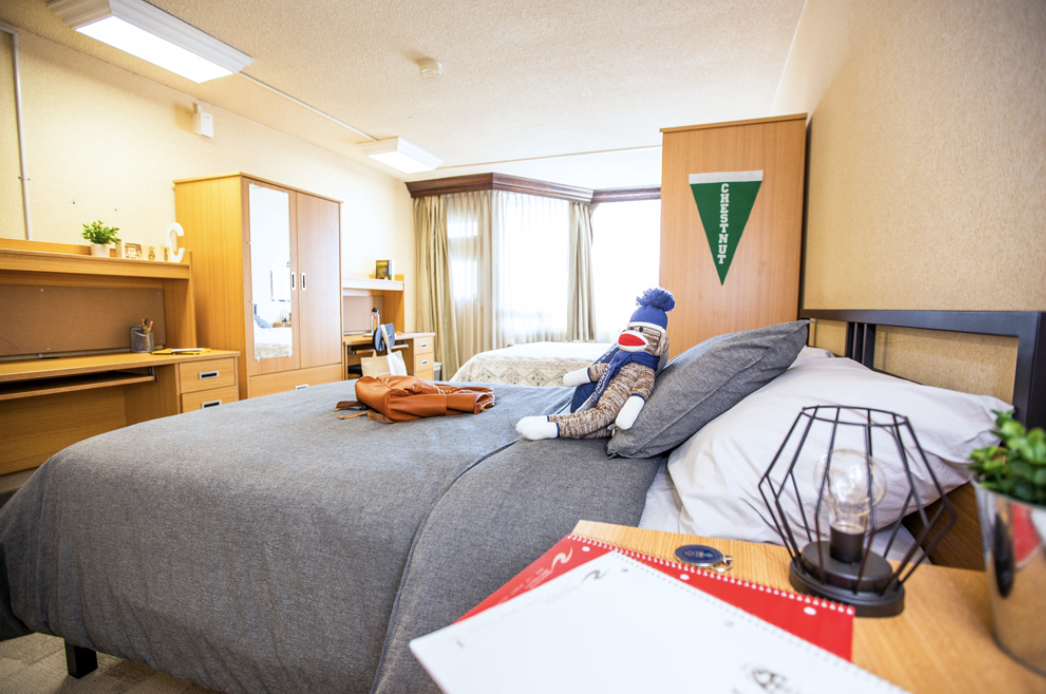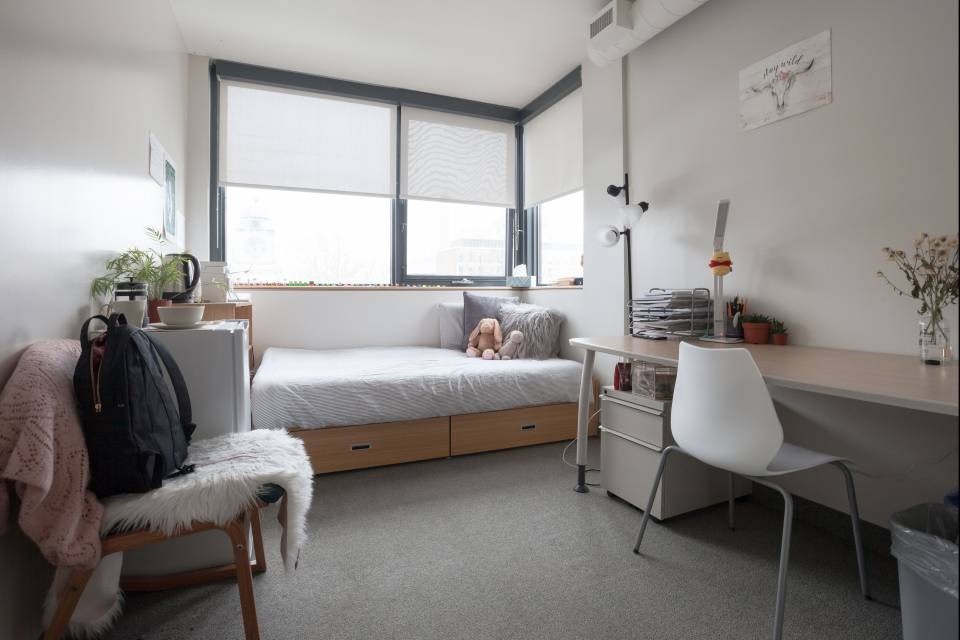
If you plan on living in residence, you should’ve accepted your residence offer now. Many first-year U of T Engineering students stay at Chestnut Residence, although you might have chosen CampusOne, Oak House, Parkside, a U of T college residence, or an external apartment instead. Regardless, moving in will be one of the very first things you’ll do as a university student! Even though the experience can be stressful, it’s also very exciting.
*Note: this page will frequently refer to Chestnut Residence; however, the information in this page is equally applicable to residences at CampusOne, Parkside, and U of T colleges, as well as external apartments.
Finding Roommates
If you haven’t already, now is the time to find roommates, if you plan on staying with one. Choosing roommates is important: you’ll be living with them for the next eight months, and a good roommate can help enhance your experience as a student. This can be a challenging task, especially if you don’t know anyone else attending U of T.
If you’ll enter a U of T student residence, you’ll have access to the StarRez portal, where you can fill out a short personal profile and browse through profiles of other students with whom you may be compatible. You can then message them and strike up a conversation.
We recommend you speak with multiple candidate roommates and select one based on sleeping habits, study preferences, shared interests, and how well you “click.” It’s very important to be honest in your personal profile about your habits – if you prefer studying late into the night, for example, you probably won’t enjoy living with a roommate who’s an early riser.
Once you move in, it’s important to establish some personal agreements and guidelines, such as noise limits and when the lights in the room will be turned off; your Residence Don will help you through this process.
Overall, staying with roommates can be a great experience. Whether you’re outgoing or more reserved, you’ll find “your people” and make connections.
Room Tours
Some residences offer room tours throughout the summer. It’s a good idea to check out your unit or ask a roommate to do so if you can’t come in-person.
Chestnut Residence holds afternoon in-person room tours until mid-August. They are a great way to see what your room will look like and determine some of the items you’ll need to bring. You’ll also see the building’s amenities so you can make the most out of your residence experience. There are also virtual residence tours that can be found on their YouTube page.
Logistics of Moving In
You’ll be notified in late summer to book a date and time for moving into your residence. During this scheduled time, you’ll receive your room key and be permitted to bring guests (such as family) to help you get set up.
Living in residence has its pros and cons. While you’ll find stores, restaurants, and entertainment within walking distance, if you don’t have a car, travelling and moving large items may be difficult. There are several chain stores nearby, such as Canadian Tire and IKEA. Our advice is to bring as many necessary items from home as possible to minimize the time and money spent shopping at the beginning of the term. You might still need to buy some items after you move in. Make sure to do so before the semester starts, otherwise, it will be even more inconvenient!
Note: For those looking to attend the engineering F!rosh Week orientation events, it’s important to plan where you’re staying for that week. Some residences (for example CampusOne) offer early move-in, so be on the lookout.
Packing List
If you’re moving into an unfurnished apartment, you’ll need to provide all your furniture, kitchenware, and other items. Usually, furnished apartments will have necessities such as a bed and a desk. Residences will be equipped with beds, desks, wardrobes, and pillows for you and your roommates. Check with your residence for the list of what is included in your room.
You should communicate with your roommate(s) to determine if you’ll be bringing any common items, such as a minifridge or laundry detergent. In this case, you should decide who’ll purchase what and how to reimburse each other.
Extremely recommended items:
- Mattress cover — goes over residence mattress (check your residence’s website for bed size information)
- Bedsheets
- Duvet or comforter and cover — main blanket
- Pillow(s) if not provided by residence
- Pillowcase(s)
- Towels — body towels, hand towels, face towels
- Toiletries — soap, shampoo, dental hygiene items, and any other products you may need
- Laundry hamper/bag
- Laundry detergent (liquid or pods)
- Flip flops for shower if your residence has communal showers. Please DON’T wear flip flops in your room’s personal shower without first consulting your roommate, and please DO wear flip flops in communal showers!
- School supplies
- Desk lamp — if your residence does not provide one
- Small trash bin — again, check if your residence provides one
- Extension cord/power bar — some rooms may only have one (reachable) power socket
- Cleaning supplies — Chestnut Residence provides weekly room cleaning
- Furniture — for unfurnished apartments
- Clothing! — we recommend you do not bring all your clothes from home; try to select some clothes that work for multiple situations! Consider weather, comfort, style, and utility (e.g. you might want some athletic clothes or formal wear)
- For students who may not be familiar with the climate in Toronto, check out the pre-arrival page by the Centre for International Experience (CIE) to prepare for all four of Toronto’s (sometimes harsh) seasons.
Optional items:
- Desktop computer/PC and/or Computer monitor – can be helpful for heavy duty 3D modelling or coding if you use a light laptop or iPad for daily work
- Noise-cancelling headphones and/or earplugs – residence can be noisy, and you’ll want to focus while studying, so you might want to invest in these.
- Food and snacks and storage containers – if you’re staying in residence, the dining halls will only be open at certain times during the day, so having snacks in your room can be extremely convenient and affordable. Be sure to keep them in proper containers to avoid attracting pests.
- Minifridge – for storing your food and snacks. Although Chestnut Residence has common refrigerators for each floor, you might choose to keep your items separately.
- Desk chair or ergonomic chair cushion– if you’re not a fan of the provided chairs
- Books, hobby items, decorations – you might want to keep some fun items to use in your spare time and remind yourself of home!
What NOT to Bring:
Student residences (and some external apartments) will have a list of banned items.
If you’re staying at Chestnut, you cannot bring:
- Candles, incense, etc.
- Cooking appliances (i.e., hot plates, rice cookers, toasters, kettles, coffee makers, etc.)
- Extra furniture
- Large stereos or DJ equipment
Be sure to check with your residence for a more comprehensive list. A packing and moving-in guideline for students staying at Chestnut Residence can found here.

Tips for Move-In Day
Move-in day is everyone’s first day, so everybody is as excited (and nervous) to meet new friends as you are!
Understand that people will be nervous and out of their comfort zones when they first get to university. You’ll also be meeting tons of new students from around the world and from all walks of life, so have a positive mindset and be accommodating. Take the first steps to build a great, inclusive community!
For now, focus on getting all your stuff in the room. Later, you can rearrange your furniture to make your room feel like your own.
Many students move in with their families and many students from out of Toronto move in on their own or with friends. There will be help available if you need extra assistance.
Tips for Life In Residence
Your residence room will be your home for the next eight months, so have some fun decorating it.
Given the choice between taking your meal up to your room in a box and eating downstairs, we recommend the latter. Eating in the dining hall is an incredible way to get a change of scenery and meet new people, and you get to knock out two birds with one stone by simultaneously eating and hanging out with friends!
Residence buildings offer a variety of services from gyms to music rooms. If you’ve never been to the gym before, want to try foosball, or have a downtown view while studying, the facilities and spaces in your residence can fulfill these desires.
Your floor don will probably organize a monthly floor-wide social, during which you can have fun and meet other people from your floor; attend these!
If you’re not from the Greater Toronto Area (GTA), take advantage of your prime location in downtown Toronto and explore! There are tons of (free or cheap) things to check out in Toronto, such as art exhibitions, basketball games, and restaurants. For more information, read the page about Having Fun in Toronto.
Make sure to keep in touch with your friends and family. Even if you’re busy and all you have to say is that you’re studying for an exam, give your people a call or fire them a quick message. Seriously, don’t skip out on this step!
